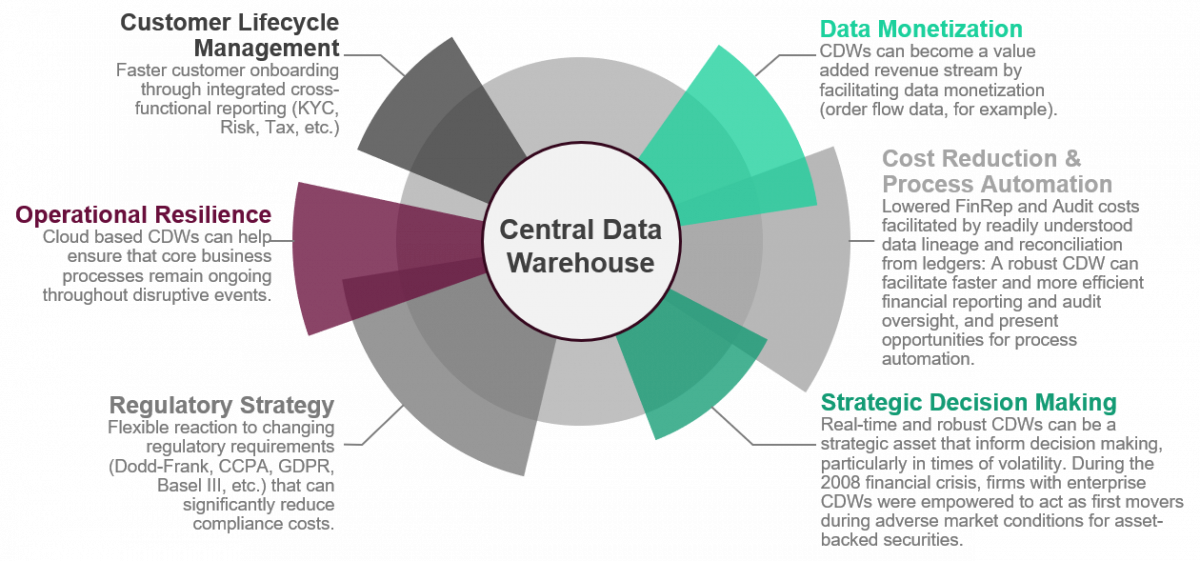Canadian Hydrogen Observatory: Insights to fuel…

A Strategic Asset for Financial Organizations
Data lies at the heart of all Finance organizations. The ability to access, manipulate, report, and transform data quickly and accurately supports not only critical business and regulatory reporting, but enables management to make smart strategic and tactical decisions with confidence.
Well-managed data undoubtedly provides an intrinsic business value, and good data management practices are essential to increasing revenue, mitigating risk, and reducing costs – particularly within finance functions.
As the amount of data increases daily as a byproduct of technological changes and enhancements, it is important for finance organizations to change their strategy from a process-driven to a data-centric strategy. To achieve this transformation, management should establish a centralized data model across business lines and support functions. One effective model to modernize an organization’s data management is Central Data Warehousing (“CDW”), a specific solution which will be elaborated upon in this article.
A Central Data Warehouse (“CDW”) is an enterprise-wide (or Line of Business “LOB”-wide) database that standardizes and validates data from disparate systems and that can facilitate access to financial information in near real-time. A well-planned CDW can effectively address the challenges that arise when an organization is dependent on a multitude of data feeds originating from independent, and often unrelated, source systems. Correctly planned and implemented, a CDW at the heart of your finance organization can generate the business intelligence and metrics required to support rapid decisions during times of volatility and uncertainty, and enables strategic decision making and execution that can extend to a competitive advantage.
Many firms across the financial industry make data a cornerstone of operational strategy to address the following common challenges:

While CDWs, and data management in general, are often associated with the back and middle office functions, evidence from decades of real-world experience suggests that they should be viewed as an firmwide strategic asset that offers tangible benefits across the enterprise. Inversely, decentralized data that is inadequately managed at an enterprise or business unit level can itself pose unique risks, including but not limited to regulatory compliance.
An enterprise CDW can provide a wide range of tangible benefits including the following:

The table below represents different scenarios in which firms either excelled or faced significant challenges based on the maturity of their data management strategy. Firms that embraced the model of central data warehousing benefited from the structure and rigor of this solution, and generally fared better than competitors who did not have a comprehensive data management strategy.

Establishing robust and comprehensive data practices is a multifaceted challenge that depends on financial institutions’ operational and regulatory demands. The questions below are intended to serve as a guide for senior management to consider while enhancing their existing data framework and structures:
Sia Partners’ deep experience across finance organizations with data and technology platforms positions us well to assist your company to employ good data management practices, up to and including developing a CDW. From creating governance frameworks and target operating models, to complex system and data integrations, we offer a wide range of solutions to address the full spectrum of data management needs.
ANTHONY ORICOLI
Managing Director
917-476-8621
anthony.oricoli@sia-partners.com
WILLIAM PALUMBO
Manager
347-449-3757
william.palumbo@sia-partners.com
OLYA SAMAKHVASTOUSKAYA
Senior Consultant
olya.samakhvastouskaya@sia-partners.com
RISHIN SHAH
Consultant
516-423-0166
rishin.shah@sia-partners.com